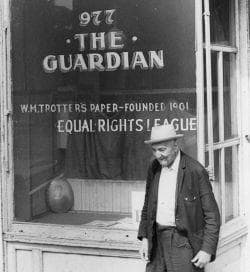Advertisement
With Banner Closure, Boston's Black Community Loses A 'Fill-In' Paper
Resume
The ink has dried on what could be the last edition of Boston's only African-American community newspaper. The weekly Bay State Banner has suspended publication amidst falling advertising revenues after more than four decades in print.
Publisher Melvin Miller hopes an investor will step in and save the publication, but many people are already lamenting the loss of an important voice in the black community. The paper, with a circulation of 34,000, covered seminal events in Boston -- such as the school busing crisis and other racially-charged issues.
For more on what the Bay State Banner's closure means, we spoke to Callie Crossley, a television and radio commentator and a media analyst at Harvard University.
Bob Oakes: In your opinion, what do you think the closure of the Bay State Banner means to Boston at large, and to the African-American community in particular?
Callie Crossley: Well, anytime you have the loss of a voice representing any kind of community, I think that’s a serious loss. I know people are saying, "Well, my goodness, we have so much media." I mean, you know, "One more thing, what does it matter? You can get all this information elsewhere."
Well, actually, you can’t. The Bay State Banner has been what I would call a “fill-in” paper, in that they have filled in the lives of African-Americans for years and years and years.
In its last edition, or what may or may not be the last edition, Mel Miller says, “the severe reduction in advertising has placed a burden on this newspaper,” but I’m wondering if you think that fully explains the Banner’s demise.
I ask because, while many major daily newspapers –such as the Boston Globe — have been struggling because advertising is way down, community newspapers in general are still performing relatively well in most cases. So what’s the Banner’s problem would you say?
Read the Banner's coverage of its own suspended publication
Well it may not be the Banner’s problem, per se, it could be, you know, being in Boston, who knows, I mean the Northeast is not exactly swimming in funds right now, as we well know.
What may have happened at the Bay State Banner -- I’m not looking at the books, I don’t know -- is that if you have a combination of the loss of a regular, major advertiser -- let’s just pick cars, I mean that’s affected the Boston Globe as well, that’s huge -- and if your mom-and-pop entities that have been doing well, but are now hit by the economy themselves and they can’t afford to advertise, that’s a double whammy.
The mom-and-pops have always been stalwarts in ethnic media, and particularly in the Bay State Banner, and I know a number of them have been suffering because of the economy. It’s hard to come back from that.
Then, on the other hand, on the non-revenue side, in terms of reaching the community of interested readers, technology has undoubtedly played a role because ethnic communities are being reached through the Internet by other writers.
There are vibrant Internet communities reaching niche audiences targeted toward certain ethnic audiences. And the Bay State Banner has certainly gone online to do that. At the same time, I gotta say though, a lot of those communities still have folks that look to see a printed publication. Probably even more so even among people who support mainstream media.
So those newspapers have had sort of a delicate balance of trying to move forward into the twenty-first century – they have to, they’ve done that, the Bay State Banner’s no different – but at the same time understanding that they have an audience to serve that is looking for a printed publication.
In the newspaper that came out this week, which may or may not be the final edition, Mel Miller says, “Publication is expected to resume once financial arrangements have been completed.” Do you think, as an analyst, that this closure is temporary or is it truly the last edition or might there be that buyer out there?
Got no crystal ball, so here’s what I can say: They’re looking for someone who can see beyond the momentary problems, with some vision about how to move and to continue to move in the twenty-first century, but who is first and foremost committed to the mission of gathering this information, distributing this information, reporting this information and making certain that this remains an institution.
I don’t know if that kind of person exists.
Tougher in this economy.
It certainly is.
This program aired on July 10, 2009.
